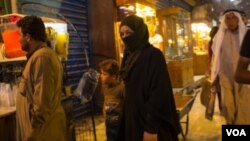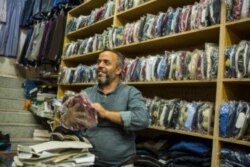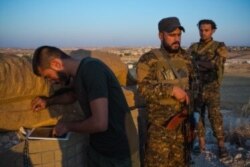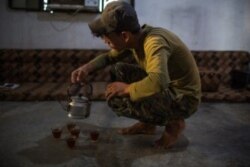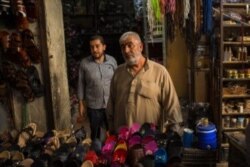For many people in parts of Syria, news that the United States was withdrawing troops on Monday was another nail in the coffin, a death knell or some other cliché that won't help them survive what may be another onslaught of chaos.
Manbij, a city near the Syrian border with Turkey, has been ruled by four different groups since 2011, including Islamic State militants and now the Kurdish forces who govern the northeast. Locals say they have lived in relative peace for the past few years, but many believe these calm days are numbered.
Both Turkey and the government of Syrian President Bashar al-Assad have threatened to take the city from the U.S.-backed and Kurdish-led Syrian Democratic Forces. The U.S. withdrawal will make way for Turkey's long-planned incursion into Syria.
"For now, things are good," said Hussain al-Hussain, a 42-year-old shopkeeper in a Manbij market selling jeans, T-shirts and belts, while speaking recently about the prospect of a U.S. withdrawal. "But everything always changes in Syria."
It has been almost a year since the U.S. first announced its departure via President Donald Trump's Twitter feed. Then Turkey announced its intention to move southward to protect its borders.
The U.S. waffled and didn't quite leave, as leaders around the world warned that Islamic State militants would grow strong again if the U.S. pulled out. Battles with IS raged on until spring, when the last militant strongholds fell, and tens of thousands of IS supporters were rounded up in camps and prisons.
The U.S. and Turkey then brokered a "safe zone" deal, and the SDF agreed to pull back from the border of Turkey.
As they withdrew weapons and troops, SDF forces built tunnels and berms in the surrounding areas, saying they were prepared to live with U.S. and Turkish troops patrolling a strip of northern Syria. But if the U.S. leaves, they said, they were also preparing to fight against Turkey.
"We will be disappointed," said Jamal Abu Jummaa, a commander in the SDF's al-Bab Military Council near the Turkish border, before Monday's announcement. "But even if the U.S. abandons us, we will fight for our people."
Preparing to fight
Turkey views its planned northern Syria operations as counterterrorism, having long equated the SDF with the PKK, a designated terrorist group that has attacked Turkish interests for decades, leading to tens of thousands of deaths.
"Turkey has been very patient and accommodating with allies to try to combat terrorism in Syria. Yet, Turkey can't wait a minute longer," said Fahrettin Altun, Turkey's communication's director, in a tweet on Monday.
The result of the operations, Altun said, will be government services and organization provided by Turkey.
Some rights groups argue that the U.S. pullout will draw both the Turkish military and Assad's military, leaving civilians trapped in the middle of another battle.
"This new deal is likely to allow Turkey to advance in the northeast and Assad to take the northwest, and force hundreds of thousands more people to flee in search of safety, said Laila Kiki, a spokesperson for The Syrian Campaign, in a statement on Monday.
"But they have nowhere left to go. They'll end up in overcrowded camps and face catastrophic humanitarian conditions, where the price of fuel is already on the rise because of this devastating news."
Betrayal
In the U.S. and around the world, Trump's critics are calling for a reversal of the decision, saying more than 10,000 fighters for Kurdish forces died combating IS militants and deserve long-term U.S. support.
For many experts, the move comes as no surprise. Jacob Shapiro, director of analysis at Geopolitical Futures, a U.S.-based research group, said he saw this coming when Kurdish forces took the lead against IS.
The result "will end up being simply another chapter in outside powers using Kurdish groups for their own purposes," he said in an email on Aug. 31.
In the markets of Manbij, some sellers say they are afraid because the Turkish military is much stronger and better equipped than Kurdish forces. The U.S. withdrawal is often referred to as a "betrayal."
Other locals are vague, preferring not to publicly say anything that might show a lack of support for whomever may be in charge next.
"Things are usually the same," said Yousuf Hamul, a 60-year-old cobbler. "The shoes are the same, and the work is the same. But now, change is coming."




